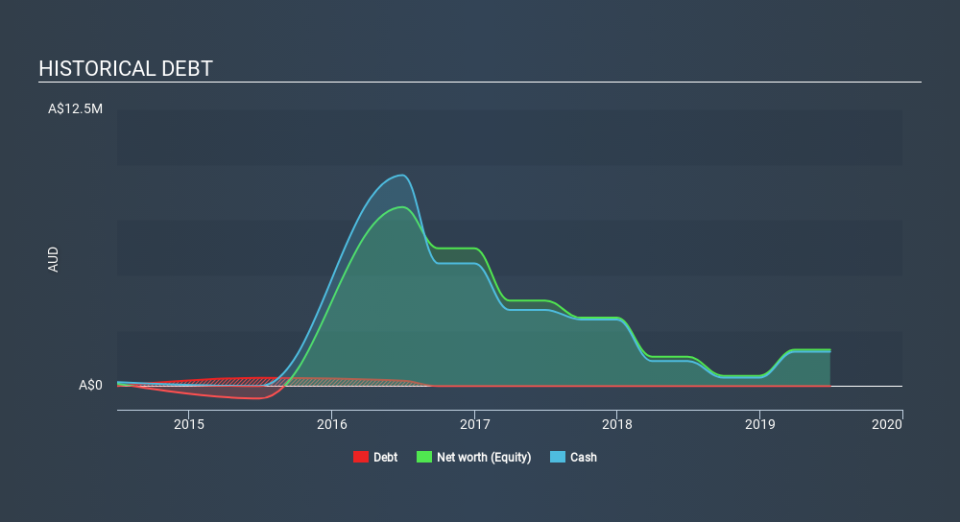The Nvoi (ASX:NVO) Share Price Has Gained 183%, So Why Not Pay It Some Attention?

The most you can lose on any stock (assuming you don't use leverage) is 100% of your money. But if you pick the right business to buy shares in, you can make more than you can lose. For example, the Nvoi Limited (ASX:NVO) share price has soared 183% return in just a single year. It's also good to see the share price up 55% over the last quarter. Unfortunately the longer term returns are not so good, with the stock falling 72% in the last three years.
See our latest analysis for Nvoi
Nvoi recorded just AU$32,463 in revenue over the last twelve months, which isn't really enough for us to consider it to have a proven product. As a result, we think it's unlikely shareholders are paying much attention to current revenue, but rather speculating on growth in the years to come. Investors will be hoping that Nvoi can make progress and gain better traction for the business, before it runs low on cash.
As a general rule, if a company doesn't have much revenue, and it loses money, then it is a high risk investment. You should be aware that there is always a chance that this sort of company will need to issue more shares to raise money to continue pursuing its business plan. While some such companies go on to make revenue, profits, and generate value, others get hyped up by hopeful naifs before eventually going bankrupt. Some Nvoi investors have already had a taste of the sweet taste stocks like this can leave in the mouth, as they gain popularity and attract speculative capital.
When it last reported its balance sheet in June 2019, Nvoi had cash in excess of all liabilities of AU$1.4m. While that's nothing to panic about, there is some possibility the company will raise more capital, especially if profits are not imminent. With the share price up 76% in the last year , the market is seems hopeful about the potential, despite the cash burn. You can click on the image below to see (in greater detail) how Nvoi's cash levels have changed over time. The image below shows how Nvoi's balance sheet has changed over time; if you want to see the precise values, simply click on the image.
Of course, the truth is that it is hard to value companies without much revenue or profit. One thing you can do is check if company insiders are buying shares. If they are buying a significant amount of shares, that's certainly a good thing. Luckily we are in a position to provide you with this free chart of insider buying (and selling).
What about the Total Shareholder Return (TSR)?
We'd be remiss not to mention the difference between Nvoi's total shareholder return (TSR) and its share price return. Arguably the TSR is a more complete return calculation because it accounts for the value of dividends (as if they were reinvested), along with the hypothetical value of any discounted capital that have been offered to shareholders. We note that Nvoi's TSR, at 297% is higher than its share price return of 183%. When you consider it hasn't been paying a dividend, this data suggests shareholders have benefitted from a spin-off, or had the opportunity to acquire attractively priced shares in a discounted capital raising.
A Different Perspective
We're pleased to report that Nvoi rewarded shareholders with a total shareholder return of 297% over the last year. This recent result is much better than the 27% drop suffered by shareholders each year (on average) over the last three. It could well be that the business has turned around -- or else regained the confidence of investors. It's always interesting to track share price performance over the longer term. But to understand Nvoi better, we need to consider many other factors. For instance, we've identified 6 warning signs for Nvoi (2 are significant) that you should be aware of.
Nvoi is not the only stock that insiders are buying. For those who like to find winning investments this free list of growing companies with recent insider purchasing, could be just the ticket.
Please note, the market returns quoted in this article reflect the market weighted average returns of stocks that currently trade on AU exchanges.
If you spot an error that warrants correction, please contact the editor at editorial-team@simplywallst.com. This article by Simply Wall St is general in nature. It does not constitute a recommendation to buy or sell any stock, and does not take account of your objectives, or your financial situation. Simply Wall St has no position in the stocks mentioned.
We aim to bring you long-term focused research analysis driven by fundamental data. Note that our analysis may not factor in the latest price-sensitive company announcements or qualitative material. Thank you for reading.


